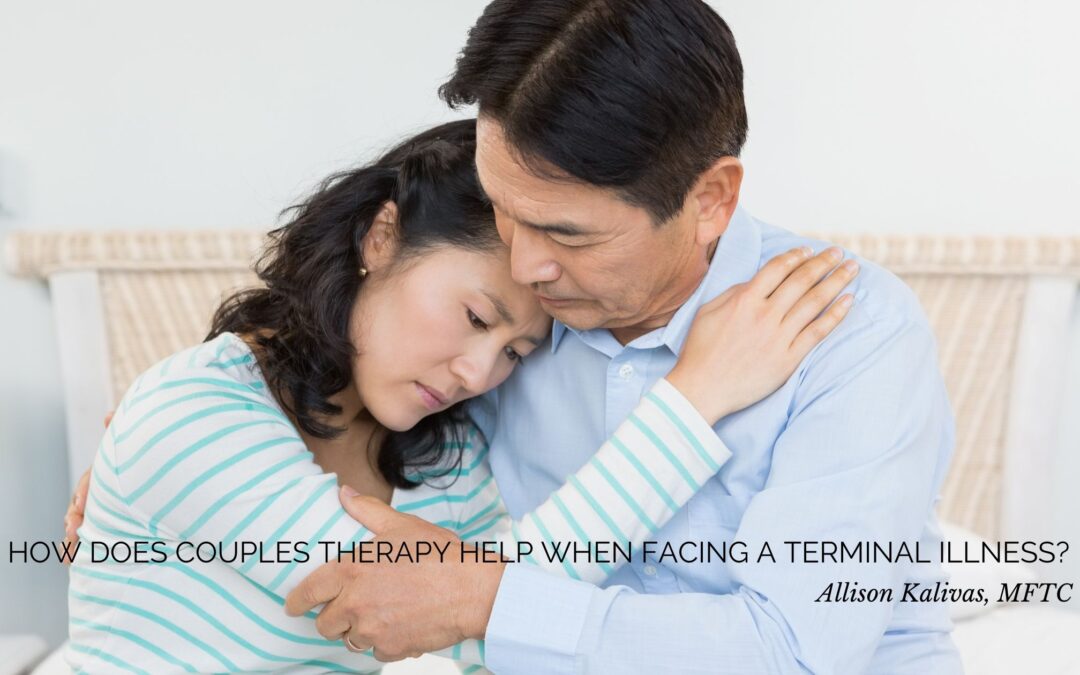Often when working with couples, I use EFT (Emotionally Focused Therapy), alongside other interventions, to aid those dealing with a terminal illness in their relationship. A terminal diagnosis is an incredible stressor that can profoundly affect a relationship. This may include role change, processing the coming death, and numerous caregiving tasks. Distress in couples with terminal illness is often characterized by criticism, resentment, and burnout on the part of the caregiving spouse, and loss of intimacy for both partners. When seeking guidance for the distress in the relationship due to a terminal illness, a couple may expect the following:
Assess attachment injuries. Terminal Illness activates an individual’s “attachment system”, causing them to default to certain behaviors according to their attachment style. It can be conceptualized as a threat to attachment bonds. Attachment injuries occur when a partner is “inaccessible and unresponsive” at a time of extreme need for the other partner. There is a high potential for these injuries given the high demands of these situations. After addressing the attachment insecurities, you can begin to focus on more balance in the caregiving system and improve coping.
- Reclaim the partnership. This can help partners adjust to a new way of being together and facilitate new patterns of reciprocity. Focus on reciprocity in caregiving puts additional focus on the partnership of the couple (vs. individual vs. healthy vs sick partner). It is important for the couple to remember what it was like to have mutual support. Without open communication of emotions, needs, and desires, it is impossible to rebuild a connection.
- Foster emotional intimacy. By helping each spouse learn that the other can handle the vulnerable emotions, which strengthen the attachment bond, couples are able to face their deepest fears and desires with one another. When partners are fully opened up to one another there is space to begin a discussion of how to build a workable life around the illness and make the most of the time they have left with one another. Together we create a safe place for the expression of commonly feared and taboo subjects around illness, and externalizing the illness and disease process as something outside themselves, something to tackle together.
- Validate both partner’s emotions. Keep in mind that the healthy spouse is affected more strongly than is often recognized and, in some cases, may be more psychologically affected than the ill spouse. They are unlikely to request help and may feel guilt regarding their emotions expressed with a secondary emotion (anger, resentment).
Process grief. Even with the work done to help rebuild a partnership, separation is inevitable, so it is necessary to do work during the therapy process to prepare for this parting. Couples in therapy during terminal illness have a unique opportunity to work together on their grief, as opposed to the healthy spouse coping alone after the death. There is a chance to share feelings, wishes, and memories with one another. Guilt is a very common emotion during the grief process, and it is frequently associated with things unsaid or undone. The healthy spouse can express these unspoken emotions to his or her partner in a safe environment. Attachment styles can be relearned during the experience of secure bonding therapy. The couple will then have the emotional and communication tools to complete the grieving process in their own time and manner.
(Source) Tie, S., & Poulsen, S. (2013). Emotionally focused couple therapy with couples facing terminal illness. Contemporary Family Therapy, 35, 557-567.
Photo Credit:
Photo by Renate Vanaga on Unsplash


 Assess attachment injuries.
Assess attachment injuries. Process grief
Process grief

